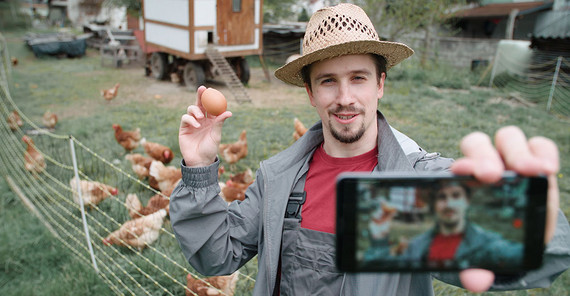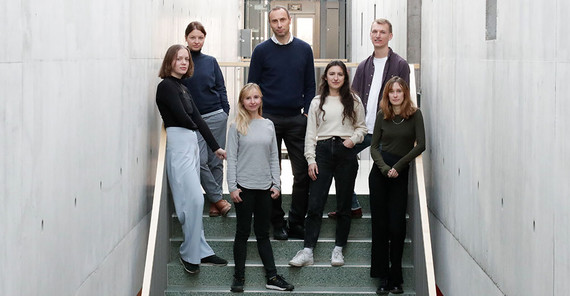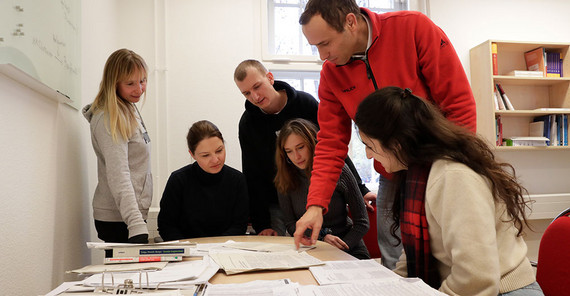“Many who pursue the profession today no longer call themselves YouTubers. They rather call themselves ‘content creators’”, Prof. Verwiebe describes the self-image of the respondents. “They say, ‘We are artists, entrepreneurs, and documentary filmmakers and comment on our time’.” The platform is constantly changing and the tasks and self-perception of the content creators have to keep up at the same pace. The new designation is just one indication of this. “Usually, there is a precise definition of what constitutes a job. In the case of YouTubers, the job description continues to develop. Those active cultivate it themselves and the community mystifies it,” he explains. Since August 2022, the research team in the DFG-funded project has been exploring the special features of the profession.
Quantitative and qualitative analyses
To do this, they rely on both qualitative and quantitative methods. Studies in sociology are usually limited to one or the other approach. “To me, this is unpersuasive,” says Verwiebe. Particularly when it comes to the self-perception of the respondents, the team cannot do without the data obtained from both methods. “For example, participants expressed that a specific training was not that relevant. In the course of the interview, however, it turned out that they felt what they had learned was ‘extremely’ important. Such a thing will only be noticed in a qualitative study,” he says. “At the same time, we found that many of those who are successful on the platform had a university degree in the field of media. That was different in the past. YouTube was seen as an entry point for people with little education.” What unites past and present YouTubers: Almost 20 years after the founding of the platform, many still start their career as a hobby.
The quantitative data is collected by PhD students Sarah Weißmann and Aaron Philipp. They retrieve the values automatically from the YouTube Data API - short for Application Programming Interface. The video platform actually provides the interface for integrating its data into apps. The researchers evaluate the publicly accessible data of all 120,000 German-language channels in an anonymized way: from the gender of the creators to the comments of the community.
The team obtains qualitative data from interviews with YouTubers. So far, they have interviewed almost 20 people, men and women, most of whom are between 20 and 40 years old. They are aiming for a total of 30-40 interviews. Because many creator personalities are clustered on the video platform, it is important to the research team to get a diverse selection of interviewees. They interview people of different genders, channel sizes, industries, etc. With their questions, they want to find out how the YouTubers deal with the algorithm, how they integrate video making and editing into everyday life and how their income is generated. The researchers will conduct the interviews until they reach “theoretical saturation”. “We can’t create a representative picture but want to work out the contrasts of the job profile,” Verwiebe explains.
Women earn more on YouTube
The researchers asked the full-time YouTubers about their networks, their social and educational backgrounds, but also about how they perceive inequalities. The respondents felt the latter to a greater or lesser extent. Based on the data, the research team already suspects that “inequalities depend on beauty standards and startup capital when opening a channel”, says research associate Claudia Buder. “Beauty” is also the keyword for the study’s first findings. “Our findings so far suggest that women earn more on YouTube than men,” Philipp explains. Established niches for female creators are, for example, gaming or the beauty sector. Large companies that provide products and pay for their placement stand behind the channels as cooperation partners. This creates an additional source of income – in addition to the opportunities that YouTube itself has offered through advertising since the 2010s.
After the interviews, the researchers regularly come together and discuss what insights the interviews offer. They do not always agree, but their work benefits from the team dynamic. “We need the exchange for interpreting what is said,” says Verwiebe.
Moody algorithm
YouTubers have to be able to deal with the specifics of their profession: As great as the personality cult around individual channel operators may be, they are dependent on two factors: the people who watch and the algorithm. “There is direct feedback for everything,” says Sarah Weißmann, who is a member of the TubeWork team. Users write comments, give “thumbs up” or decide to subscribe to a channel. The algorithm uses unknown criteria to calculate which videos are played to whom. “Nowadays, people have to deal with complex, self-learning algorithms. It is difficult to understand how they work. The algorithm is a capricious god,” Verwiebe summarizes how the respondents feel about the technical regulations. “But the creators themselves also contribute to the myth of the ‘algorithm’: Information about it is shared and different strategies are developed for dealing with it,” adds Nina-Sophie Fritsch.
The creators often run a channel on their own and determine the topics themselves. In general, the content that is conveyed through the videos is very strongly linked to the individual person, Buder explains. However, working according to personal preferences and turning one’s personal interests into a profession does not only have advantages. “Boundaries between work and private life often dissolve,” Nina-Sophie Fritsch says. “We notice this with self-employed people in general and with YouTube creators even more.” This already becomes evident in the use of space at home, she says. “People often work on their laptops in bed or their desks are right next to their beds.” What other insights the team will gain remains to be seen. One thing is clear, however: “The data is extremely rich,” Verwiebe says. There is a lot to do for him and his team, who want to use the results in an interdisciplinary way and internationally. The profession of the YouTuber has reached German academia.
The Project
TubeWork - the new occupational field of YouTubers in Germany
Inequality and self-economization in algorithm-based markets
Funding: German Research Foundation (DFG)
Duration: 2022–2025
Principal investigator: Prof. Dr. Roland Verwiebe; scientific staff: Claudia Buder (MA), Sarah Weismann (M.Sc.), Aaron Phillip (MA), Marie Theres-Hesse (BA), Chiara Osorio Krauter (BA)
The Researcher
Prof. Dr. Roland Verwiebe studied social sciences at Humboldt-Universität zu Berlin and Columbia University in New York. He received his PhD in Berlin in 2003. His research has brought him to Hamburg, New York, and Vienna, among other places. Since 2019, he has held the Chair for Inequality Research and Social Stratification Analysis at the Faculty of Economics and Social Sciences at the University of Potsdam.
Email: sozialstrukturuuni-potsdampde
This text was published in the university magazine Portal Wissen - Eins 2023 „Lernen“ (PDF).



